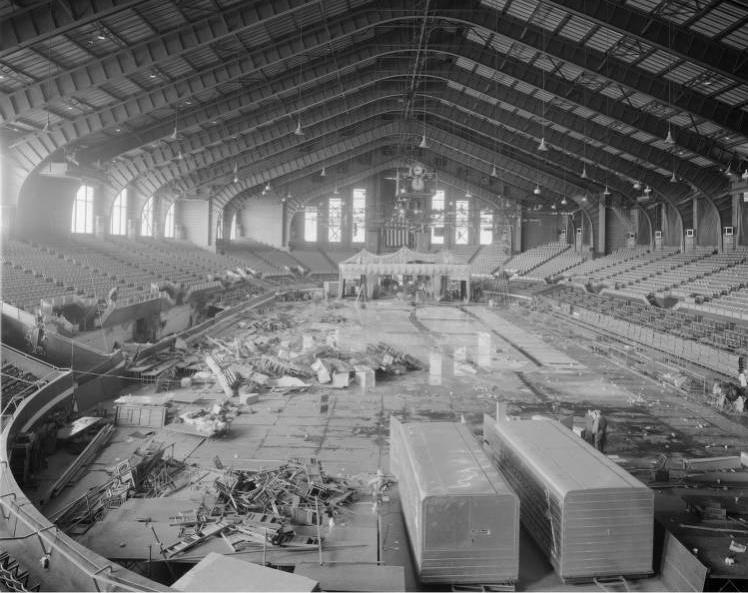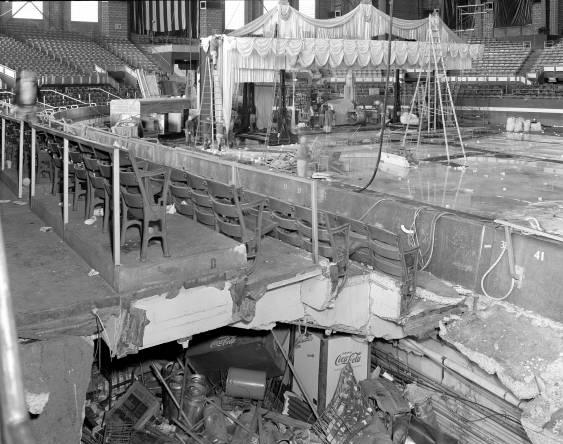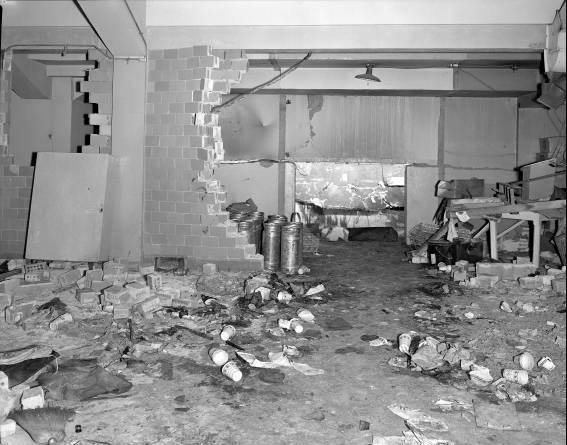On October 31, 1963, Shriners Night at the Coliseum, the Holiday on Ice performance ended abruptly when a propane tank in the concession area ignited and exploded. The concession area was located directly underneath the south-side mezzanine seats. A faulty valve on an improperly stored liquified petroleum (LP) gas tank allowed gas to leak near an electric popcorn warmer.

The resulting explosion propelled the audience, seating, and slabs of concrete flooring from a 700-square-foot area around aisle 13 through the air and onto the ice. Victims landed up to 60 feet away. Chunks of concrete rained down upon crowded seating areas on all sides. It remains one of the worst disasters in Indianapolis history.
Some of the box seat spectators fell into the blast pit and were crushed when a damaged support wall collapsed and an additional 500 square feet of floor caved in. A few minutes later the remaining propane tanks created a secondary explosion. A fireball rose from the crater to the ceiling, burning those who had rushed to the area after the first explosion and incinerating those who had fallen into the blast pit.

The audience remained remarkably calm as it left the Coliseum. Some remained to assist the performers and staff in caring for the injured and to free trapped survivors. The police, fire department, Civil Defense, Red Cross, Salvation Army, and hundreds of volunteers used buses, ambulances, and private cars to transport the injured to area hospitals. Rescuers established a temporary hospital in the cattle barn, and the coroner’s office set up a temporary morgue on the ice floor. After all other efforts failed, the eventually brought a mobile crane into the Coliseum to lift the concrete slabs still covering victims.
Fifty-four people died outright from impact injuries, flying debris, and burns. The number of deaths later reached 74. Approximately 400 others were injured, some permanently. The Marion County grand jury indicted the state fire marshal, the Indianapolis fire chief, the general manager and concessions manager of the Indianapolis Coliseum Corporation, and several officers of the LP gas supplier for charges ranging from dereliction of duty to involuntary manslaughter. However, the single conviction—the president of Discount Gas Corporation for assault and battery—was later reversed by the Indiana State Supreme Court, and charges against all other individuals were eventually dropped.

The Coliseum Disaster Relief Fund, sponsored by the , raised over $78,000 ($660,000 equivalent in 2020) from public donations for victim assistance. Years of litigation followed. Over 413 lawsuits, for amounts totaling $70 million, were filed for damages against various insurance companies and the State of Indiana. The LP gas firm’s insurance distributed $1.1 million among 379 victims and estates. An out-of-court settlement of $3.5 million resolved hundreds of other individual suits.

Help improve this entry
Contribute information, offer corrections, suggest images.
You can also recommend new entries related to this topic.